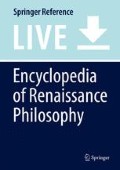Abstract
Moses Maimonides is probably the most important, certainly the most influential, Jewish philosopher of all times. Both his philosophical and juridical works became fundamental references of the Jewish culture already in his lifetime, but they also underwent several sharp critiques. During the Renaissance, his philosophical masterpiece, The Guide for the Perplexed, was either read according to the platonic orientation of the time or criticized as the main expression of an extreme rationalistic attitude; in both cases, it was universally admired and quoted. This is true also for the representatives of the so-called Jewish Averroism during the Renaissance; in fact, these authors were Maimonidean-Averroists.
The prestige of Maimonides was great among Christian scholars, too. His philosophy inspired some important Christian cabalists, and the Guide was translated into Latin and considered a work important for religious thought in general, which was exceptional, in a period of widespread rebuttal of the Jewish postbiblical doctrines, seen as false and vane. The Mishneh Torah, the main juridical work by Maimonides, was also partially translated into Latin, when the curiosity for Jewish laws and rites grew in the Christian world.
References
Primary Sources
Del Medigo, E. 1984, Sefer Be h inath ha-dath. Tel-Aviv.
Maimonides, M. 1520, Rabi Mosei Dux, seu Director dubitantium aut perplexorum […] summa accuratione […]Augustini Iustiniani […] recognitus. Paris.
Maimonides, M. 1629, Doctor perplexorum […] in Linguam Latinam conversus a Johanne Buxtorfio, Fil. Basel.
Maimonides, M. 1963, The Guide of the Perplexed, Translated with an Introduction and Notes by Shlomo Pines. Chicago.
Sforno, ‘O. 1987, Sefer or ‘ammim, in Kitvei Rabbi ‘Ovadia Sforno, 399–508, Jerusalem
Secondary Sources
Althshuler, M. 2009. Rabbi Joseph Karo and Sixteenth-Century Messianic Maimonideanism. In The cultures of Maimonideanism. New approaches to the history of Jewish thought, ed. J. T. Robinson. Supplements to the Journal of Jewish Thought and Philosophy 9, 191–210.
Bonfil R. 1993. Rabbis and Jewish communities in Renaissance Italy. London-Washington.
Burnett S. G. 2012. Christian Hebraism in the Reformation Era (1500–1660). Leiden-Boston.
Dienstag J. I. 1972. Mishneh Torah le-ha-Rambam. In Studies in Jewish Bibliography, History and Literature in Honor of I. Edward Kiev, ed. Ch. Berlin, 21–41. New York,
Dienstag J. I. 1974. Translators of Maimonides Mishneh Torah into Latin. A Bio-Bibliographical Survey. In Salo Wittmayer Baron Jubilee volume. On the occasion of his eightieth birthday, English Section, vol. 1, 287–309. Jerusalem.
Dweck, Y. 2011. The Scandal of Kabbalah. Leon Modena, Jewish Mysticism, Early Modern Venice. Princeton-Oxford.
Feldman, S. 2005. Maimonides. A guide for posterity. In The Cambridge companion to Maimonides, ed. K. Seeskin, 324–359. Cambridge.
Guetta, A. 2005. La traduzione italiana cinquecentesca del Moreh nevukhim di Maimonide. In Percorsi di storia ebraica, ed. P.C. Ioly Zorattini, 281–303. Udine.
Hasselhoff, G. K. 2004. Die Drucke einzelner lateinischer Übersetzungen von Werken des Maimonides im 16. Jahrhundert als Beitrag zur Entstehung der modernen Hebraistik: Agostino Giustiniani und Sebastian Münster. In Gottes Sprache in der philologischen Werkstatt. Hebraistik vom 15. bis zum 19. Jahrhundert., ed. G. Veltri, G. Necker, 169–188.
Hughes, A.W. 2004. Transforming the Maimonidean Imagination: Aesthetics in the Renaissance Thought of Judah Abravanel. Harvard Theological Review 97(4): 461–484.
Katchen, A. L. 1984. Christian Hebraists and Dutch Rabbis. Cambridge, MA.
Leicht, R. 2005. Der erste cristliche Leser des hebraischen Moreh Nevukhim. In The Trias of Maimonides/Die Trias des Maimonides, ed. G. Tamer, 411–428. Berlin.
Licata, G. 2013. La via della ragione. Elia del Medigo e l’averroismo di Spinoza. Macerata.
Pines Sh., 1983. Medieval Doctrines in Renaissance Garb? Some Jewish and Arabic Sources of Leone Ebreo’s Doctrines. In Jewish Thought in the Sixteenth Century, ed. B. D. Cooperman, 365–395. Cambridge, MA.
Roling, B. 2004. Maimonides im Streit der Konfessionen: Die ‘Statera prudentium’ des Paulus Ricius und die cristliche Neulektüre des Maimonides im 16. Jahrhundert. In Gottes Sprache in der philologischen Werkstatt. Hebraistik vom 15. bis zum 19. Jahrhundert, ed. G. Veltri, G. Necker, 149–168. Leiden-Boston.
Sáenz-Badillos, A. 2009. Late Medieval Jewish Writers on Maimonides. In Traditions of Maimonideanism, ed. C. Fraenkel, 223–244. Leiden.
Author information
Authors and Affiliations
Corresponding author
Editor information
Editors and Affiliations
Rights and permissions
Copyright information
© 2015 Springer International Publishing Switzerland
About this entry
Cite this entry
Guetta, A. (2015). Maimonideanism in the Renaissance. In: Sgarbi, M. (eds) Encyclopedia of Renaissance Philosophy. Springer, Cham. https://doi.org/10.1007/978-3-319-02848-4_161-1
Download citation
DOI: https://doi.org/10.1007/978-3-319-02848-4_161-1
Received:
Accepted:
Published:
Publisher Name: Springer, Cham
Online ISBN: 978-3-319-02848-4
eBook Packages: Springer Reference Religion and PhilosophyReference Module Humanities and Social SciencesReference Module Humanities

